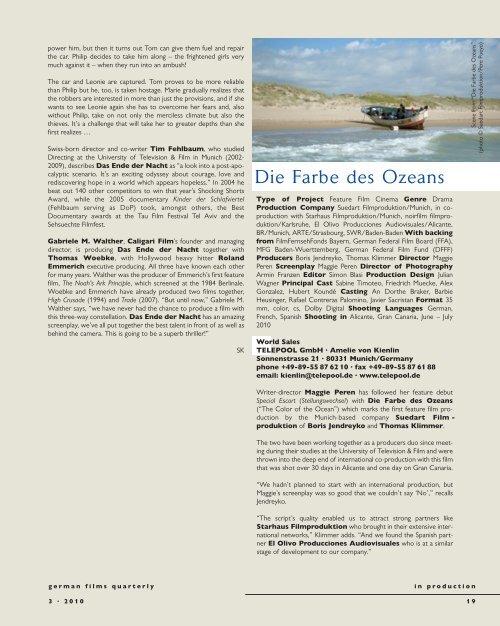German Films
German Films
German Films
You also want an ePaper? Increase the reach of your titles
YUMPU automatically turns print PDFs into web optimized ePapers that Google loves.
power him, but then it turns out Tom can give them fuel and repair<br />
the car. Philip decides to take him along – the frightened girls very<br />
much against it – when they run into an ambush!<br />
The car and Leonie are captured. Tom proves to be more reliable<br />
than Philip but he, too, is taken hostage. Marie gradually realizes that<br />
the robbers are interested in more than just the provisions, and if she<br />
wants to see Leonie again she has to overcome her fears and, also<br />
without Philip, take on not only the merciless climate but also the<br />
thieves. It’s a challenge that will take her to greater depths than she<br />
first realizes …<br />
Swiss-born director and co-writer Tim Fehlbaum, who studied<br />
Directing at the University of Television & Film in Munich (2002-<br />
2009), describes Das Ende der Nacht as “a look into a post-apocalyptic<br />
scenario. It’s an exciting odyssey about courage, love and<br />
rediscovering hope in a world which appears hopeless.” In 2004 he<br />
beat out 140 other competitors to win that year’s Shocking Shorts<br />
Award, while the 2005 documentary Kinder der Schlafviertel<br />
(Fehlbaum serving as DoP) took, amongst others, the Best<br />
Documentary awards at the Tau Film Festival Tel Aviv and the<br />
Sehsuechte Filmfest.<br />
Gabriele M. Walther, Caligari Film’s founder and managing<br />
director, is producing Das Ende der Nacht together with<br />
Thomas Woebke, with Hollywood heavy hitter Roland<br />
Emmerich exe cutive producing. All three have known each other<br />
for many years. Walther was the producer of Emmerich’s first feature<br />
film, The Noah’s Ark Principle, which screened at the 1984 Berlinale.<br />
Woebke and Emmerich have already produced two films together,<br />
High Crusade (1994) and Trade (2007). “But until now,” Gabriele M.<br />
Walther says, “we have never had the chance to produce a film with<br />
this three-way constellation. Das Ende der Nacht has an amazing<br />
screenplay, we’ve all put together the best talent in front of as well as<br />
behind the camera. This is going to be a superb thriller!”<br />
SK<br />
Die Farbe des Ozeans<br />
Type of Project Feature Film Cinema Genre Drama<br />
Production Company Suedart Filmproduktion/Munich, in coproduction<br />
with Starhaus Filmproduktion/Munich, noirfilm filmproduktion/Karlsruhe,<br />
El Olivo Producciones Audiovisuales/Alicante,<br />
BR/Munich, ARTE/Strasbourg, SWR/Baden-Baden With backing<br />
from FilmFernsehFonds Bayern, <strong>German</strong> Federal Film Board (FFA),<br />
MFG Baden-Wuerttemberg, <strong>German</strong> Federal Film Fund (DFFF)<br />
Producers Boris Jendreyko, Thomas Klimmer Director Maggie<br />
Peren Screenplay Maggie Peren Director of Photography<br />
Armin Franzen Editor Simon Blasi Production Design Julian<br />
Wagner Principal Cast Sabine Timoteo, Friedrich Muecke, Alex<br />
Gonzalez, Hubert Koundé Casting An Dorthe Braker, Barbie<br />
Heusinger, Rafael Contreras Palomino, Javier Sacristan Format 35<br />
mm, color, cs, Dolby Digital Shooting Languages <strong>German</strong>,<br />
French, Spanish Shooting in Alicante, Gran Canaria, June – July<br />
2010<br />
World Sales<br />
TELEPOOL GmbH · Amelie von Kienlin<br />
Sonnenstrasse 21 · 80331 Munich/<strong>German</strong>y<br />
phone +49-89-55 87 62 10 · fax +49-89-55 87 61 88<br />
email: kienlin@telepool.de · www.telepool.de<br />
Writer-director Maggie Peren has followed her feature debut<br />
Special Escort (Stellungswechsel) with Die Farbe des Ozeans<br />
(“The Color of the Ocean”) which marks the first feature film production<br />
by the Munich-based company Suedart Film -<br />
produktion of Boris Jendreyko and Thomas Klimmer.<br />
The two have been working together as a producers duo since meet -<br />
ing during their studies at the University of Television & Film and were<br />
thrown into the deep end of international co-production with this film<br />
that was shot over 30 days in Alicante and one day on Gran Canaria.<br />
“We hadn’t planned to start with an international production, but<br />
Maggie’s screenplay was so good that we couldn’t say ‘No’,” recalls<br />
Jendreyko.<br />
“The script’s quality enabled us to attract strong partners like<br />
Starhaus Filmproduktion who brought in their extensive international<br />
networks,” Klimmer adds. “And we found the Spanish partner<br />
El Olivo Producciones Audiovisuales who is at a similar<br />
stage of development to our company.”<br />
german films quarterly in production<br />
3 · 2010 19<br />
Scene from “Die Farbe des Ozeans”<br />
(photo © Suedart Filmproduktion/Pere Pueyo)

















